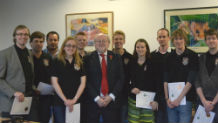
The iGEM team accepts an award from University Vice-Chancellor Professor Sir Steve Smith
Exeter students take bronze at international biology competition
A multidisciplinary team of Exeter undergraduates captured bronze in the European round of the international Genetically Engineered Machines (iGEM) competition.
The iGEM competition challenges student teams to design new biological systems and operate them in living cells using an engineering approach.
With funding from the University’s Annual Fund, the Wellcome Trust and academic leads within Biosciences, Exeter competed against 51 other teams at the European Jamboree in Amsterdam from 5-7 October.
The team represented a diverse group of students from Biosciences, Physics, Engineering, and Mathematics & Computer Sciences. The project, devised and led by the students, saw the team undertake the complex task of modifying polysaccharides using an innovative approach: synthetic biology. This opportunity to work as an interdisciplinary group allowed the team to capitalise on the varied approaches to problem-solving taken by researchers from different fields.
The study of polysaccharides is integral to research in medicine and industry, and can be applied to environmental problems such as water management and food production. The iGEM experience offered the team exposure to solving these real-world problems in the lab, as well as opportunities to pursue postgraduate research.
Under the guidance of Drs Thomas Howard, Christine Sambles and Rafael Pena-Miller, and with the support of academics from across the University, the group prepared for the competition over the summer. Local sixth-form students were invited to participate in the lab work, and the team held talks in the community to create awareness of the innovations in synthetic biology.
Exeter competitor Mary Beton said of her iGEM experience, “Synthetic biology is a fascinating emerging field. The experience of iGEM taught me as much in a summer as a year of my degree.
“Working with students from other disciplines was refreshing and outright brilliant. The enormous potential for creative, self-directed research was completely new to me and I think every student should do it.”
The student-led project demonstrates the University’s ambition to provide a research-led experience for all of its students. The momentum from the project has encouraged other interdisciplinary projects, and a new cohort of Exeter students is already being recruited for next year’s competition. View the Exeter team wiki for details of their research.
The Annual Fund helps support projects at the University that would otherwise not receive funding. Donations make a significant and immediate impact upon the quality of the Exeter experience for our students. Find out about other projects funded by the Annual Fund.
Date: 1 November 2012
